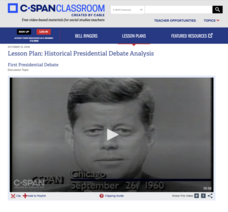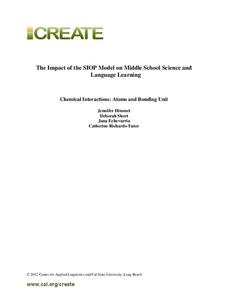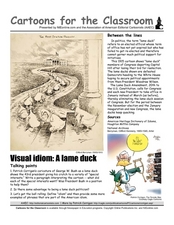Curated OER
Cartoons for the Classroom: Campaign Echoes
In this current events worksheet, students analyze a political cartoon about the 2008 Presidential campaign and respond to 3 talking point questions.
Curated OER
Cartoons for the Classroom: 2004 Presidential Election
In this current events activity, students analyze a political cartoon about the 2004 election and respond to 5 short answer questions.
Curated OER
Cartoons for the Classroom: Charisma vs. Experience
In this current events worksheet, students analyze a political cartoon about the 2008 Presidential election and respond to 3 talking point questions.
C-SPAN
Presidential Debate Analysis
The modern presidency is defined by the development of television—including the use of televised debates in the campaign. Using debates going back to the first one between John F. Kennedy and Richard Nixon, young scholars evaluate...
Curated OER
Pass This Jobs Bill
It seems that print media is slowly being replaced by electronic versions. Get your kids reading the New York Times e-style. They'll read the provided article entitled, "Pass This Jobs Bill" then answer six comprehension questions. Two...
PBS
What Are the Primaries and Caucuses?
What are the essential differences between primaries and caucuses? As part of a study of the process by which Americans select their candidates for US president, class members examine the nominating process, the changes that have...
Center for Applied Linguistics
Chemical Interactions: Atoms and Bonding
Watch budding chemists interact with the resource on chemical interactions. In the unit, six lessons provide an overview of basic chemistry, from understanding the development of atomic theory to distinguishing between ionic and covalent...
Franklin D. Roosevelt Presidential Library & Museum
Voting and Participation in Decision Making
"If you don't vote - you don't count." That's the big idea in this resource about voting and participation in the democratic process. The three included activities focus students on being informed voters, practicing voting for their...
Curated OER
Take a Stand!
Here is a four-corner debate-style activity specifically geared to election year issues. Learners group themselves according to whether they strongly agree, agree, disagree, or strongly disagree with statements that relate to elections...
Curated OER
The Class Party
Students take a closer look at presidential elections. In this Electoral College lesson, students participate in a classroom simulation that requires them to form a political party that puts forth a candidate to run for election.
Curated OER
Academic Raceway 500
In this community government PowerPoint, students participate in a game with a race track format in which they answer questions about local government, the election process, and the decision making process used in a democracy.
Curated OER
The Importance of Inauguration Day
As Inauguration Day approaches, prepare your learners by researching the protocol of years past.
Curated OER
Cartoons for the Classroom: Herblock at 100
In celebration of renowned cartoonist Herb Block's Library of Congress exhibition, this handout includes 2 of his famous political cartoons for scholars to analyze. Background information describes "Herblock's" career, and talking points...
Curated OER
Cartoons for The Classroom: Lame Duck Congress
Clear up "lame duck" congressional confusion with this political cartoon analysis worksheet. Background information on the concept's history and current use is provided, and 2 cartoons give a past and present context. Three talking...
Curated OER
Cartoons for the Classroom: Celebrating the 19th Amendment
Eighty-eight years after women earned the right to vote, a women ran for president. Young analysts consider the role women play in politics, how they are portrayed, the standards they are held to, and if they are still treated unfairly...
Curated OER
Cartoons in the Classroom: Stagflation
What is stagflation? Have your social studies class examine this political cartoon to define stagflation and understand recession as its defined in a political context. This worksheet would be a great warm up activity, perfect for extra...
Curated OER
Cartoons for the Classroom: Charisma vs. Experience
Which is more important for a president: experience or charisma? Scholars consider this as they analyze 2 political cartoons in this analysis handout. Background information gives context through a quote from The Telegraph, and 3 talking...
C-SPAN
Big Data and Politics
Movie selection means more than entertainment. Learners consider what information Netflix gathers to understand the concept of "big data." Resource includes clips of experts talking about corporations that harvest the details of our...
Maryland Department of Education
The Concept of Identity Lesson 8: Propaganda in Visual Media
Visual and print propaganda are featured in a lesson that asks readers of A Separate Peace to examine the techniques used in propaganda from World War I, World War II, presidential elections, and in the novel.
Curated OER
Playing it Safe
Young scholars explore the importance of an election and act as political advisers for an upcoming election. Students create platforms for various candidates, by writing a letter to their candidate with suggestions for winning the election.
Curated OER
Shifting Wins
Students analyze how the outcome of the 2002 midterm elections changed the balance of power in the government. They write a news analysis and evaluation of how the nation be governed in the future.
Curated OER
Primary Concerns
Students articulate their understanding of the primary process, critically evaluate the primary process on a systemic level and explore the significance of the Super Tuesday primaries on a Presidential election.
Curated OER
Lose a Vote, Gain a Vote
Students explore the issues behind close Senatorial races. They investigate the qualities of political leaders, the 2002 senatorial elections and the differences and similarities between the Republican and Democratic parties.
Curated OER
Rocking the Vote
Students explore how a presidential candidate can win the popular vote but not receive enough electoral votes to win the election. They analyze various regions' voting trends, explore how these trends reflect the outcome of the 2004...
Other popular searches
- Classroom Elections Speeches
- Classroom Elections Platform
- Classroom Elections Speecher
- Classroom Elections Speech Er

























